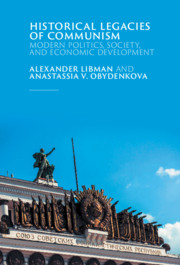Book contents
- Historical Legacies of Communism
- Historical Legacies of Communism
- Copyright page
- Dedication
- Contents
- Figures
- Maps
- Tables
- Acknowledgments
- Abbreviations
- 1 Introduction
- 2 The CPSU Legacy: Leninism or Clientelism?
- 3 Cultural Environment and Soviet Cinematography as a Legacy of the CPSU
- 4 Measuring CPSU Legacies
- 5 Democracy
- 6 Corruption
- 7 Inequality
- 8 Mortality
- 9 Attitudes Toward Migrants
- 10 Economic Development and Innovations
- 11 The Origin and Persistence of Legacies
- 12 Conclusion
- Bibliography
- Index
2 - The CPSU Legacy: Leninism or Clientelism?
Published online by Cambridge University Press: 27 January 2021
- Historical Legacies of Communism
- Historical Legacies of Communism
- Copyright page
- Dedication
- Contents
- Figures
- Maps
- Tables
- Acknowledgments
- Abbreviations
- 1 Introduction
- 2 The CPSU Legacy: Leninism or Clientelism?
- 3 Cultural Environment and Soviet Cinematography as a Legacy of the CPSU
- 4 Measuring CPSU Legacies
- 5 Democracy
- 6 Corruption
- 7 Inequality
- 8 Mortality
- 9 Attitudes Toward Migrants
- 10 Economic Development and Innovations
- 11 The Origin and Persistence of Legacies
- 12 Conclusion
- Bibliography
- Index
Summary
In this chapter, we develop the theoretical framework of the book. Specifically, we advance the concept of the Janus-faced legacies of the CPSU. On the one hand, the CPSU is seen as an example of “Communist” legacies, associated specifically with the functioning of Communist rule in Russia. On the other hand, CPSU legacies can be associated with the prevailing clientelism and patronal politics of the Communist era. CPSU legacies could be associated with the ideological loyalty of the former Communists to the party, but also (and this appears to be more likely, given the contemporary accounts) with opportunism and willingness to adjust to any political environment in order to promote one’s career. The chapter links the investigation of the book to the broader literature on historical legacies, as well as outlines the main hypotheses guiding our investigation.
- Type
- Chapter
- Information
- Historical Legacies of CommunismModern Politics, Society, and Economic Development, pp. 18 - 51Publisher: Cambridge University PressPrint publication year: 2021

